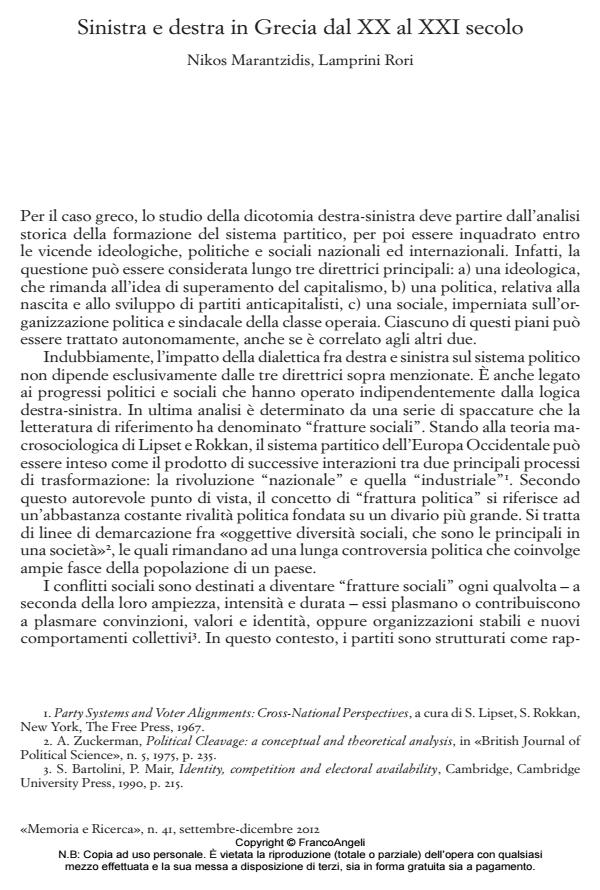Sinistra e destra in Grecia dal XX al XXI secolo
Titolo Rivista MEMORIA E RICERCA
Autori/Curatori Nikos Marantzidis, Rori Lamprini
Anno di pubblicazione 2013 Fascicolo 2012/41 Lingua Italiano
Numero pagine 15 P. 69-83 Dimensione file 121 KB
DOI 10.3280/MER2012-041005
Il DOI è il codice a barre della proprietà intellettuale: per saperne di più
clicca qui
Qui sotto puoi vedere in anteprima la prima pagina di questo articolo.
Se questo articolo ti interessa, lo puoi acquistare (e scaricare in formato pdf) seguendo le facili indicazioni per acquistare il download credit. Acquista Download Credits per scaricare questo Articolo in formato PDF

FrancoAngeli è membro della Publishers International Linking Association, Inc (PILA)associazione indipendente e non profit per facilitare (attraverso i servizi tecnologici implementati da CrossRef.org) l’accesso degli studiosi ai contenuti digitali nelle pubblicazioni professionali e scientifiche
Left and Right in Greece from the 20th into the 21st century The article explores the evolution of left/right division in Greece, drawing upon macro sociological theories regarding social and political cleavages. It analyses the major historical divisions that have given meaning to the left/right dichotomy and have structured Greek party system over a century. Among a series of wars, civil quarrels, economical and political crises, which have taken place throughout the Twentieth century, two civil conflicts have marked political rivalries and configured political identities: the National Schism (1915-1917) and the Civil War (1943-1949). They have established a three-camp party system, which had endured until the 1967-1974 military dictatorship. The democratization of the country and the liberalization of political institutions in the post-junta era gave birth to new coalitions and political formations, which established a two-party system on the basis of right/anti-right dichotomy. The outbreak of economic crisis in 2010 and the austerity measures that came as a consequence have divided society and politics in two camps: the advocates and opponents of the Memorandum. The political stances regarding the management of the crisis has magnified the significance of pro/anti-memorandum cleavage and, thus, weakened the importance of the left/right division.;
Keywords:National Schism, Military dictatorship, Civil War, Cleavage, Democratization, European memorandum
- Les élections législatives grecques de 2015 : alterner et punir Lamprini Rori, in Pôle Sud /2015 pp.137
DOI: 10.3917/psud.043.0137 - L’ambition sans remords : SYRIZA et l’exercice du pouvoir Lamprini Rori, in Pôle Sud /2017 pp.85
DOI: 10.3917/psud.045.0085
Nikos Marantzidis, Rori Lamprini, Sinistra e destra in Grecia dal XX al XXI secolo in "MEMORIA E RICERCA " 41/2012, pp 69-83, DOI: 10.3280/MER2012-041005